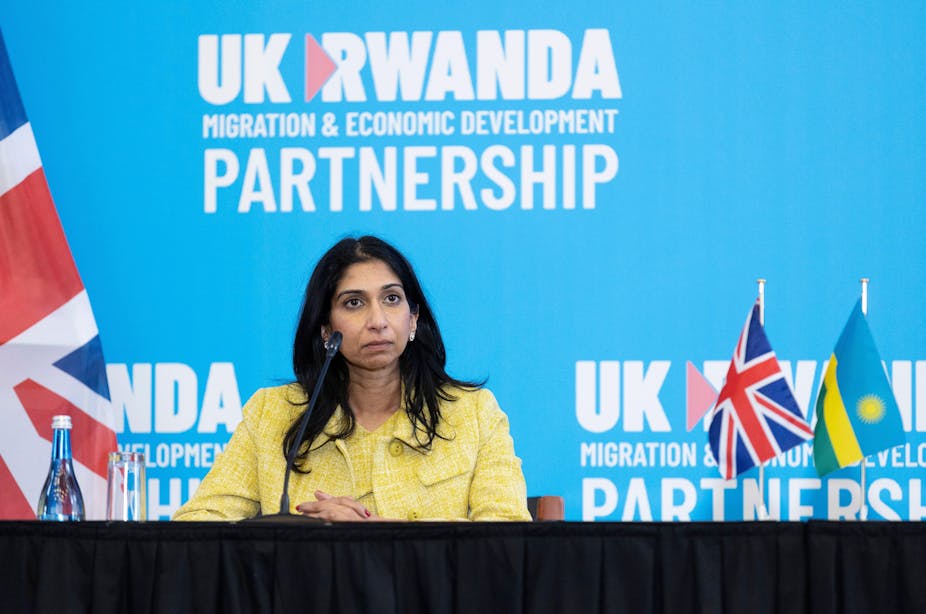The Court of Appeal has ruled against the UK government’s plan to send asylum seekers to Rwanda, adding a significant legal hurdle to the prime minister Rishi Sunak’s promise to “stop the boats”.
Under the migration partnership announced in April 2022, the UK government could send people to Rwanda who had entered the UK irregularly. Rwanda would then determine their asylum claims and, if they were found to be refugees, they would be resettled there. The government has argued this will deter people from making dangerous boat crossings across the English Channel, despite evidence showing such policies don’t work.
After a series of legal challenges, the European Court of Human Rights intervened to stop the first deportation flight from taking off.
In December 2022, the High Court found that the Rwanda policy was lawful. Now, the Court of Appeal has overturned that decision.
The main question for the court was whether Rwandan officials would accurately and fairly assess the asylum claims of people sent there from the UK. The claimants, a group of 10 refugees and the organisation Asylum Aid, argued that the Rwandan legal system would put genuine refugees at risk of being erroneously returned to countries where they would face persecution.
Two out of three judges agreed, finding that Rwanda’s current asylum system is not reliably fair and effective, citing five key reasons:
Asylum interviews are conducted in a brief and perfunctory manner, which could prevent a person from being able to fully explain their case;
Rwanda’s committee to determine refugee status does not allow lawyers to make arguments on behalf of a person, to help explain why they should be granted asylum;
Local non-governmental organisations do not have capacity to provide asylum seekers with legal assistance throughout the process;
Rwandan officials deciding applications do not have sufficient skill and experience to make reliable decisions, partly due to a lack of effective training; and
Judges in Rwanda may be susceptible to political influence and reluctant to overturn decisions not to grant asylum.
While the court noted there was nothing to indicate Rwanda was not trying its best to determine asylum claims fairly, Lord Justice Underhill observed that “aspiration and reality do not necessarily coincide”.
The majority judges also noted concerns about the safety of asylum seekers in Rwanda, including the extent to which Rwandan authorities are tolerant of protest and dissent. In 2018, Rwandan police shot and killed 12 refugees who were protesting a reduction in their food rations. Sir Geoffrey Vos found that these concerns were relevant to considering whether Rwanda was a “safe third country”.
All three judges agreed with the High Court’s decision on other grounds, including that sending asylum seekers to a third country is not necessarily incompatible with the UN Refugee Convention. This will no doubt be a worrying finding for critics of the government’s policy, who hoped the court would reinforce the UK’s obligations under international law.
This ruling effectively gives the government license to pass the burden of refugee protection on to poorer nations, even if they are prevented from sending people to Rwanda for now.
A win for asylum seekers
This judgment is a victory for refugees and the organisations that support them. It means that no asylum seekers in the UK will be sent to Rwanda for now – and maybe not ever.
These proceedings began with seven men being handcuffed, shackled and highly distressed as they were forced on to a plane. Over the past year, many men and women have received letters placing them at risk of removal to Rwanda. For these people, this judgment is not just a legal win, but a source of immense relief.

What’s next?
The illegal migration bill, which is currently facing fierce opposition from the House of Lords, legally requires the home secretary to detain and remove any person who arrives in the UK irregularly. With removals to Rwanda now unavailable, the viability of the bill is even less apparent.
Rishi Sunak and Suella Braverman have said they will appeal the judgment to the Supreme Court. But even if the government succeeds, there is little to show that the plan will stop people travelling irregularly to the UK. The government’s own analysis acknowledges as much, stating:
Academic consensus is that there is little-to-no evidence suggesting changes in a destination country’s policies have an impact on deterring people.
The plan has already cost at least £120 million, and would cost a further £169,000 per person deported (compared with the £106,000 per person it costs to house an asylum seeker in the UK). With legal costs now stacking up, the Rwanda plan is quickly becoming very expensive.
These legal developments are a clear signal that the government should rethink its policy. If the government wanted to help people in need of protection while reducing the number of people risking their lives on small boats, it could open more safe and legal routes to the UK for people to seek asylum. Instead, ministers are doubling down on a plan that is costly, legally precarious, unlikely to work, and risks exposing people to more danger, rather than helping them reach safety.

